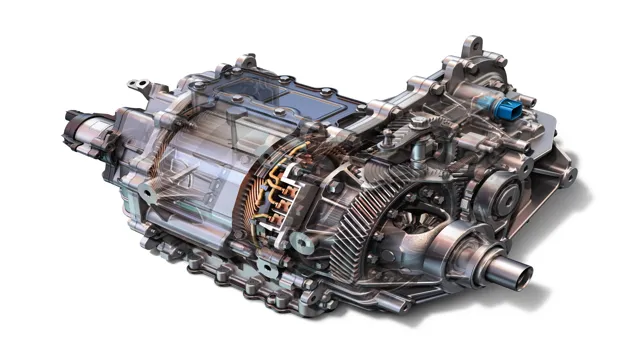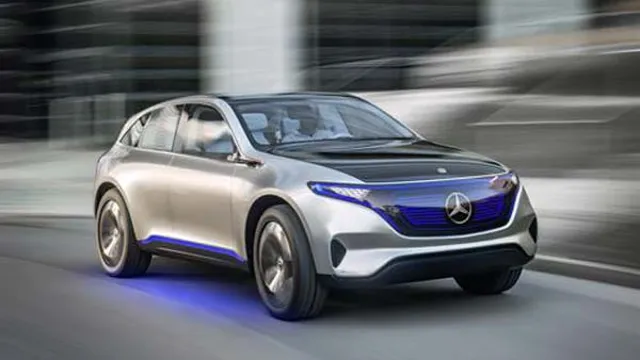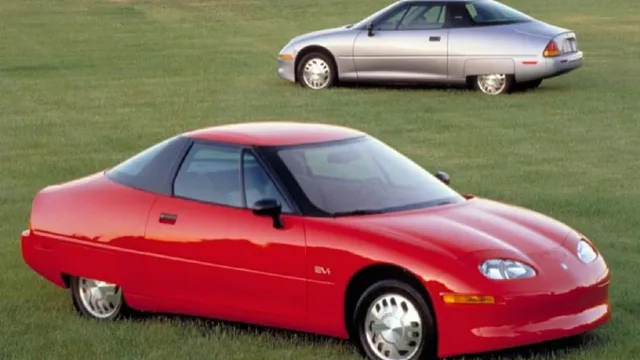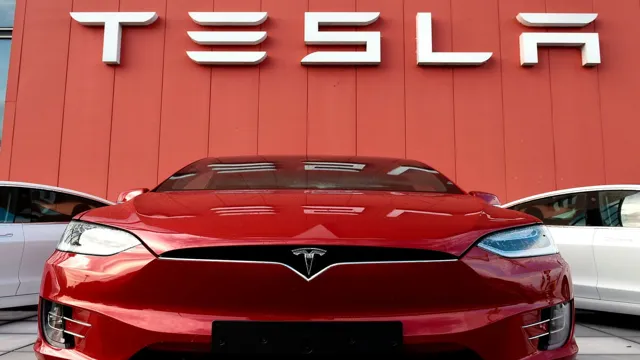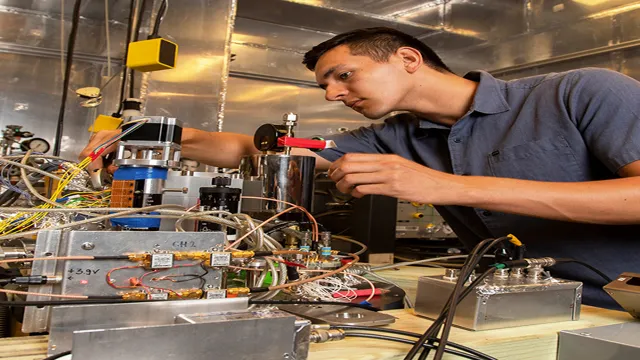Revolutionizing the Road: The Future of Electric Car Motor Technology
The world is changing, and so is the automotive industry. Electric cars, once thought of as a distant dream, are fast becoming a reality. With their sleek designs and quiet, efficient motors, electric cars are revolutionizing the way we think about transportation.
But how do they work, and what makes them different from traditional gasoline-powered vehicles? The answer lies in the electric car motor technology. These motors use electricity instead of gasoline to power the vehicle, eliminating harmful emissions and reducing our dependence on fossil fuels. Electric motors are also extremely efficient, converting up to 90% of the energy stored in their batteries into motion.
That means you can travel further on a single charge and save money on fuel costs in the long run. One of the most exciting things about electric car motor technology is that it’s constantly evolving. New advances in battery technology and motor design are making electric cars more affordable, reliable, and powerful than ever before.
And with government incentives and growing public interest in green technology, there’s never been a better time to embrace the electric car revolution. So whether you’re a tech enthusiast or just looking for a more sustainable way to get around, electric cars are the way of the future. With electric car motor technology at the forefront of this change, we can create a cleaner, brighter future for ourselves and future generations.
What is Electric Car Motor Technology?
Electric car motor technology refers to the system that propels electric cars forward. It comprises of a motor, batteries, power electronics, and a controller. The electric motor’s primary purpose is to convert electrical energy from the battery into mechanical energy, turning the car’s wheels.
The type of motor used in electric cars is typically a brushless motor, which does not contain any carbon brushes and operates at high speeds. The motor receives electrical power from the batteries, and the controller regulates the amount of current that flows to the motor to control its speed and torque. The use of electric cars is increasing globally as there are environmental benefits to using them since they do not emit any harmful pollutants into the environment.
Furthermore, an electric car motor is incredibly quiet and efficient, making it an ideal choice for city driving.
Introducing the Concept of Electric Vehicles
Electric car motor technology is the heart and soul of electric vehicles. Essentially, electric vehicles are powered by an electric motor that is driven by electricity stored in one or more large batteries. But what sets electric car motor technology apart from traditional vehicle engines is their ability to convert electrical energy into mechanical energy, which transforms into motion to power the vehicle forward.
Simply put, electric car motor technology is what drives an electric vehicle, and it plays a vital role in the overall performance, efficiency, and driving experience. In many ways, electric car motor technology is like the brain of the car, constantly working behind the scenes to ensure the vehicle is running smoothly and efficiently. As this technology continues to advance, we can expect to see even more innovative electric cars hitting the roads in the years to come, paving the way for a greener and more sustainable future.

How Electric Car Motors Work
Electric car motors are a fascinating technological achievement that has been gaining popularity in recent years. These motors work by using electricity to create a magnetic field that forces the rotor to rotate, creating power that propels the car forward. Unlike traditional gasoline engines, electric car motors do not require fuel to operate, which makes them more environmentally friendly and cost-effective.
These motors are incredibly efficient, producing far less waste and heat than traditional engines. This means that electric cars can run for longer without needing to be recharged, making them an excellent option for both short and long-distance driving. The technology behind electric car motors is constantly evolving, and there are now a variety of different types available, each with its unique advantages and drawbacks.
Overall, electric car motors are a remarkable step forward in green transportation technology, and they offer a promising future for sustainable transportation.
Benefits of Electric Car Motors
Electric car motors are the future of transportation, and for good reason. Compared to traditional gasoline engines, electric car motors are more efficient, environmentally friendly, and offer a better driving experience. With electric car motor technology, drivers can reduce their carbon footprint and save money on gas by taking advantage of charging stations.
Electric cars also have regenerative braking systems that can generate and store energy, allowing the car to extend its range. Moreover, electric motors are quieter and more responsive than traditional combustion engines, providing a smooth, comfortable and exhilarating ride. In the long run, investing in electric car motor technology can benefit both the driver and the environment, ensuring a cleaner and sustainable future for all.
Reduced Carbon Footprints and Air Pollution
Electric Car Motors Electric car motors offer a variety of benefits for both individual drivers and the environment. One of the primary benefits of electric car motors is their reduced carbon footprint and air pollution. Electric cars do not emit harmful pollutants into the atmosphere, unlike traditional gasoline engines that release carbon dioxide, nitrogen oxides, and other pollutants that have been linked to respiratory illnesses, neurological disorders, and cancer.
By using electric car motors, we can reduce our carbon footprint and help combat global warming. Not only that, but electric car motors also offer a more silent and smoother ride than traditional gas-powered cars, making them a more pleasant and relaxing driving experience. Investing in an electric car motor is not only an environmentally conscious choice, but also a practical and enjoyable option for anyone in need of a ride.
High Efficiency and Low Maintenance Costs
Electric car motors offer numerous benefits, and one of the most significant is their high efficiency and low maintenance costs. Unlike gasoline engines, electric motors have few moving parts, which means they require less maintenance and repair. Additionally, they do not require oil changes, spark plugs, or timing belts, which can save car owners hundreds or even thousands of dollars in maintenance costs over the life of the vehicle.
The high efficiency of electric motors is due to their ability to convert up to 90% of the energy stored in the battery into motion, while gasoline engines typically only convert around 35% of the fuel’s energy into motion. This results in lower energy costs, as well as reduced emissions and a longer driving range per charge. With electric car technology constantly evolving, we can anticipate even greater efficiency and lower maintenance costs in the near future.
Future Innovations of Electric Car Motors
Electric car motors have revolutionized the automotive industry as they offer several benefits to both drivers and the environment. One of the main advantages of an electric car motor is its energy efficiency, which is significantly higher than that of gasoline engines. It means that electric cars consume less energy and produce fewer greenhouse gas emissions.
Additionally, electric car motors require less maintenance due to their simpler design, and their electric drivetrain provides a smoother, silent ride. As automakers continue to improve their electric car models, we can expect to see even better performance and range, making electric cars a more attractive option for drivers. But the benefits of electric car motors extend beyond just transportation.
As more people switch to electric cars, we can reduce our dependence on fossil fuels and decrease our carbon footprint, helping to mitigate the effects of climate change. With all these advantages, it’s no wonder electric cars are becoming increasingly popular.
Comparison with Gasoline Engines
When it comes to electric car motor technology, there are some notable differences between these motors and their gasoline counterparts. One key difference is that electric car motors don’t require any fuel to run. Instead, they draw their power from batteries that can be charged up with electricity from a charging station.
This means that electric cars can be more cost-effective to operate in the long run, especially if you live in an area where electricity rates are lower than gasoline prices. Another advantage of electric car motors is that they tend to be more efficient than gasoline engines, which means they can go farther on a single charge than a gas-powered car can travel on a single tank of fuel. It’s important to note, however, that electric car motors can have drawbacks as well, such as their limited range and longer charging times compared to filling up a gas tank.
Nonetheless, with the advances in electric car motor technology, more and more drivers are making the switch to electric vehicles, enjoying the benefits that come with this alternative way of driving.
Performance and Speed
When comparing electric motors with gasoline engines, one of the most significant differences is the issue of performance and speed. While gasoline engines are known for their raw power and acceleration, electric motors offer a smoother and more consistent ride. Unlike gasoline engines, electric motors don’t need to mechanically shift gears, which means they can deliver maximum torque without any lag time.
This is why electric motors are often faster off the line than their gasoline-powered counterparts. However, when it comes to top speed, gasoline engines still have the edge. Gasoline engines have a broader power range, which allows them to maintain top speed for longer periods.
Ultimately, the choice between electric motors and gasoline engines depends on individual preferences, but with the increasing advancements in technology, electric motors are closing the gap in speed and performance.
Costs and Environmental Impact
When it comes to costs and environmental impact, electric vehicles are a clear winner compared to gasoline engines. While electric vehicles may have a higher initial purchase price, they make up for it in the long run through lower maintenance costs and fuel expenses. Gasoline-powered vehicles require regular oil changes, fluid replacements, and engine tune-ups, which can add up over time.
In addition, electric vehicles emit zero or significantly less carbon emissions during operation, making them a more environmentally-friendly option. On the other hand, gasoline engines emit harmful pollutants such as carbon monoxide, nitrogen oxides, and particulate matter, which contribute to poor air quality and climate change. Switching to an electric vehicle might be a bigger investment upfront, but it can pay off in the long run in terms of both finances and the environment.
The Future of Electric Cars and Motors
Electric car motor technology is advancing rapidly and driving the future of transportation. Electric motors provide many benefits over traditional internal combustion engines including cleaner emissions, lower maintenance costs, and instant torque. With the implementation of more efficient batteries and advancements in motor technology, it is projected that electric vehicles will become more affordable and have a longer range.
Additionally, advancements in autonomous driving technology will make electric vehicles even more convenient and accessible. The future of electric cars and motors is bright, and we can expect to see continued growth and innovation in this field as it transforms the way we move.
Conclusion
In conclusion, electric car motor technology is not just a passing trend, it’s a revolutionary step towards a sustainable future. It offers a cleaner, quieter, and more efficient alternative to the traditional combustion engine. And with advancements in battery technology, electric cars are proving to be just as practical for everyday use.
So the next time you see an electric car zooming past you, don’t be shocked – embrace the spark of innovation that’s driving us towards a brighter tomorrow!”
FAQs
What is electric car motor technology?
Electric car motor technology refers to the development and use of electric motors in vehicles instead of traditional internal combustion engines. This technology allows for a cleaner and more sustainable form of transportation.
How do electric car motors work?
Electric car motors work by using electric power from either a battery or fuel cell to generate a magnetic field that rotates a shaft, which then turns the wheels of a car.
What are the advantages of electric car motor technology?
Electric car motor technology offers a number of advantages, including reduced emissions, lower fuel costs, and improved performance. Additionally, electric motors require less maintenance than traditional engines.
What are the limitations of electric car motor technology?
Despite its many advantages, electric car motor technology also has some limitations. For example, electric vehicles currently have limited range compared to traditional cars, and the battery technology used to power them can be expensive to produce and maintain. Additionally, there is a lack of charging infrastructure in many areas.
